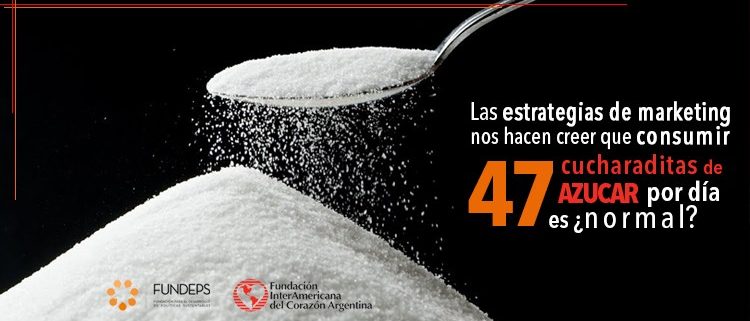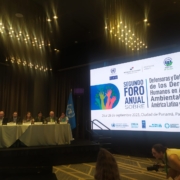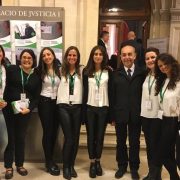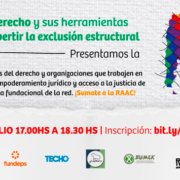Introducing amicus curiae to defend the right to information and health
“Below, we offer a google translate version of the original article in Spanish. This translation may not be accurate but serves as a general presentation of the article. For more accurate information, please switch to the Spanish version of the website. In addition, feel free to directly contact in English the person mentioned at the bottom of this article with regards to this topic”
On August 10, we made a presentation before the Colombian Constitutional Court to clarify the content and scope of the fundamental right to health. An amicus curiae (friend of the court or friend of the court) is a presentation made by a non-litigious third party, where he voluntarily offers an opinion on some aspect of law, to collaborate with the court in the resolution of the litigation.
The Colombian Association of Consumer Education (Educar Consumidores) launched in August 2016 a campaign called “Take care of your life – Tómala en Serio”, which sought to provide information on the harmful health consequences of regular consumption of certain sugary drinks. In the framework of this campaign, a video was broadcast on television and on radio that showed the high sugar content of these beverages, connecting these behaviors with health complications such as diabetes or obesity, which occur both in Colombia and throughout Region of Latin America. Postobon S.A., a sweetened beverage company from Colombia, denounced this video before the Superintendency of Industry and Commerce (SIC). As a result, the SIC prohibited by resolution 59176, the dissemination of the commercials alleging that it was “misleading advertising” for not having scientific or medical support for their assertions.
Resolution 59176 issued by the SIC ordered Educar Consumidores to cease the dissemination of the commercial. Also, it ordered to send to the office of the Delegation of Research and Consumer Protection of the SIC, any advertising piece that in the future wishes to transmit on the consumption of sweetened beverages (BBAA) before its publication. This restriction would apply to any medium of communication, including social networks; And the SIC established it with the objective of exercising prior control over it and deciding whether to authorize its publication and dissemination or not, under penalty of fine.
Faced with this situation, Educar Consumidores filed a lawsuit claiming for violation of its freedom to express itself in a matter of public interest. At the same time, Dejusticia filed a supplementary legal action claiming that the resolution of the SIC violated the right of consumers to access relevant information. After different instances and a very good decision of the Supreme Court of Colombia that was already commented by FUNDEPS, both cases were accumulated by the Constitutional Court. In this instance, the Constitutional Court will have the opportunity to clarify the limits of the commercial discourse and its differences with the awareness campaigns. At the same time, it may raise the relevance of access to information to ensure the right to health and to make consumer decisions with adequate information.
The amicus presented together with FiC Argentina provides arguments of international human rights law that we consider relevant for the resolution of the case. With this intervention, we hope to contribute to the solution of a case that we consider to be of extreme importance for both Colombia and the rest of Latin America. Judicial processes like this have great repercussions both globally and regionally, as they generate valuable jurisdictional background on the important issue of healthy eating.
The foundations of the amicus curiae seek to demonstrate that the measures adopted by the SIC resolution mean a violation of human rights obligations at different levels, while weakening the possibilities of responding to a global epidemic of malnutrition and obesity. On the one hand, it violates the freedom of expression of a civil society organization, it is even a clear prior censorship regarding its action in the public sphere. It also implies a violation of human rights obligations as it violates the recommendations of monitoring bodies on how to deal with the obesity epidemic. Different bodies and specialized offices such as CDESC, CRC or rapporteurs for the right to health or the right to food have pointed out that the obesity epidemic is definitely a human rights problem affecting a vulnerable population: children And adolescents.
From FUNDEPS and FIC Argentina we believe that this decision will have relevance both within Colombia and at the regional level. The growth of obesity – with a particularly strong impact on children and adolescents – and the strong presence of advertising strategies in the food industry are repeated throughout the region. Chronic noncommunicable diseases are the leading cause of death in the world. It is the duty of the State to respect, guarantee and protect the rights of its citizens, especially when dealing with fundamental issues such as the protection of health. Therefore, the decision of the Court in this case will be important beyond the borders of Colombia.
More information
– Amicus Curiae presented at Colombian Constitutional Court
Author
María Victoria Gerbaldo
Contact
Agustina Mozzoni – agustinamozzoni@fundeps.org
Juan Carballo – juanmcarballo@fundeps.org











